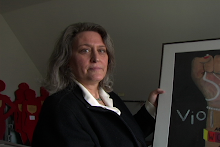We're thrilled to announce that we've named our board of advisers. These 11 people have kindly offered to share their expertise with the project -- to look over our shoulders a bit as we complete the film and launch distribution and outreach.
The make up of the board reflects the scope of the film. Advisers come from our three primary locations: Duluth, MN; Baltimore, MD; and New York. The advisers are:
Cathryn Curley, Safe Haven Shelter
Ed Heisler, Community Education Coordinator, Safe Haven Shelter
Debra Holbrook, coordinator, forensic nursing, Mercy Medical Center, Baltimore, MD
Sally MacNichol, Director of Programs, Connect NYC
Tanya Macleod, Organizer, Voices of Women Organizing Project
Scott Miller, Domestic Abuse Intervention Project, coordinator of men’s' groups and coordinated community response.
Colleen Moore, Family Violence Response Program, Mercy Medical Center, Baltimore, MD
Anne Paulle (Board Chair), DV consultant; Adjunct Prof., Monroe College
Linda Riddle, Executive Director, Domestic Abuse Intervention Project
Ruth Smith, VIP Community Services, Bronx NY; Adjunct Prof, Monroe College
Evan Stark, Professor, School of Public Affairs and Administration, Rutgers-Newark.
Tuesday, March 24, 2009
Friday, March 13, 2009
Immigrants and Domestic Violence
The plight of immigrant women -- and particularly undocumented immigrant women -- who are victims of domestic violence is a critically important aspect of domestic violence in America. The huge influx of immigrants in recent decades has transformed many communities and brought to this country many women who are particularly vulnerable. The issue is made even more complex by different cultural traditions, including those where domestic violence is condoned.
We devoted yesterday to adding a major new immigrant character to our growing rough cut -- the important story of Ynocensia, an undocumented woman from Mexico who fled her husband (and a lifetime of abuse) and came to New York. A few months later, her husband showed up at her door, and the cycle continued. The story has a happy ending: the family eventually called the police, who intervened effectively. An order of protection ultimately protected Ynocensia from her husband. Now, tYnocensia has a work permit and is waiting for permanent residency -- with the help of Sanctuary for Families, she has applied for (and waits for), a U-Visa.
Thavi has been cutting away, and has made a major breakthrough with a strong new 20-minute version of the film. We'll be adding the Ynocensia footage over the weekend. Thavi, poor guy, has valiantly has moved on with his life, following his near miss at winning an Oscar for Best Documentary for his film, "The Betrayal." He vows to be back at the Academy within two years.
We devoted yesterday to adding a major new immigrant character to our growing rough cut -- the important story of Ynocensia, an undocumented woman from Mexico who fled her husband (and a lifetime of abuse) and came to New York. A few months later, her husband showed up at her door, and the cycle continued. The story has a happy ending: the family eventually called the police, who intervened effectively. An order of protection ultimately protected Ynocensia from her husband. Now, tYnocensia has a work permit and is waiting for permanent residency -- with the help of Sanctuary for Families, she has applied for (and waits for), a U-Visa.
Thavi has been cutting away, and has made a major breakthrough with a strong new 20-minute version of the film. We'll be adding the Ynocensia footage over the weekend. Thavi, poor guy, has valiantly has moved on with his life, following his near miss at winning an Oscar for Best Documentary for his film, "The Betrayal." He vows to be back at the Academy within two years.
Wednesday, March 4, 2009
Linda Mills on Chris Brown
Linda Mills has been one of the more controversial figures in the domestic violence community. Her books have attracted a lot of attention, including an appearance for Mills on "Oprah." Mills, a professor and vice provost at NYU, has just been quoted in People with comments about the Chris Brown incident. Here's what Mills had to say:
But it's love, in all its complexities, that can often be the most powerful force for reconciliation for a battered woman. "They have insight into somebody in a way that none of us do," says Mills, who runs a program in Arizona that brings together couples with family members and a volunteer from the community to talk over what actually happened in a domestic-violence event. The process usually goes on for months. "The ideal might be that we can separate people who are in a violent relationship, but the problem is that that's not the reality," Mills says. "I address the reality, which is that people go back, and they're looking for avenues for the possibility of working through this issue like any other rupture in a relationship, working through this issue to the point where the violence could stop."
This is bound to provoke controversy in the domestic violence community. When Mills is given an opportunity in a mass-circulation publication to urge women in relationships with abusers to flee for safety, Mills instead speaks about working things out.
We interviewed Mills for "Power and Control" and have an excerpt from the interview on the film's main site. Some people in the DV community have objected to our including Mills in the film. It's tough for me, as the director, to face this criticism, because I have so much respect for the battered women's movement and people who work in domestic violence. But in the final analysis, I'm committed to presenting current significant ideas in domestic violence, and there's no question that Mills has had a high profile and considerable influence.
Looking forward to hearing from our readers on this one!
-- Peter Cohn
But it's love, in all its complexities, that can often be the most powerful force for reconciliation for a battered woman. "They have insight into somebody in a way that none of us do," says Mills, who runs a program in Arizona that brings together couples with family members and a volunteer from the community to talk over what actually happened in a domestic-violence event. The process usually goes on for months. "The ideal might be that we can separate people who are in a violent relationship, but the problem is that that's not the reality," Mills says. "I address the reality, which is that people go back, and they're looking for avenues for the possibility of working through this issue like any other rupture in a relationship, working through this issue to the point where the violence could stop."
This is bound to provoke controversy in the domestic violence community. When Mills is given an opportunity in a mass-circulation publication to urge women in relationships with abusers to flee for safety, Mills instead speaks about working things out.
We interviewed Mills for "Power and Control" and have an excerpt from the interview on the film's main site. Some people in the DV community have objected to our including Mills in the film. It's tough for me, as the director, to face this criticism, because I have so much respect for the battered women's movement and people who work in domestic violence. But in the final analysis, I'm committed to presenting current significant ideas in domestic violence, and there's no question that Mills has had a high profile and considerable influence.
Looking forward to hearing from our readers on this one!
-- Peter Cohn
Labels:
Chris Brown,
domestic abuse,
domestic violence,
Linda Mills,
Rihanna
Subscribe to:
Comments (Atom)







